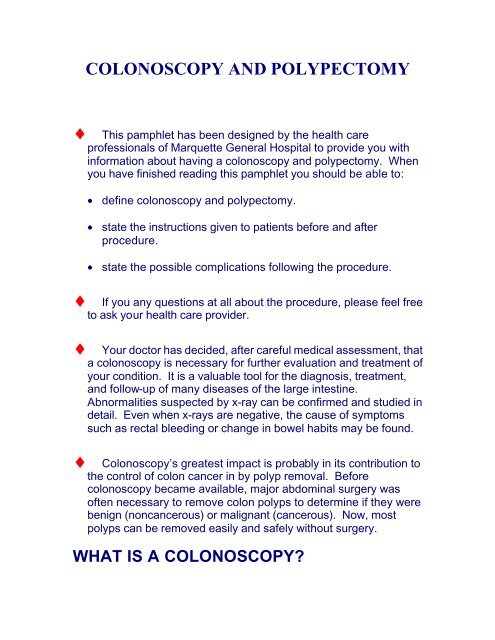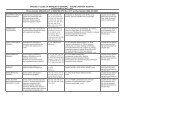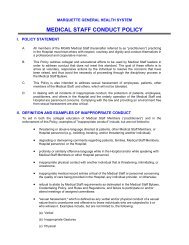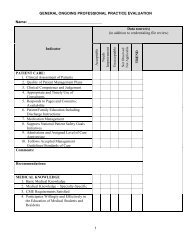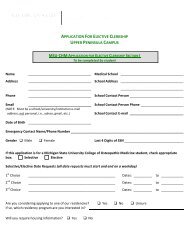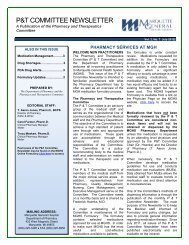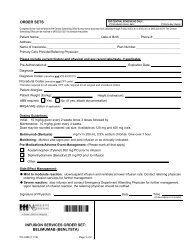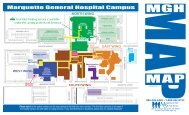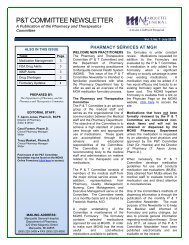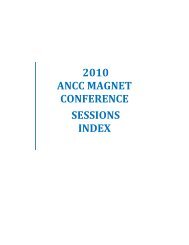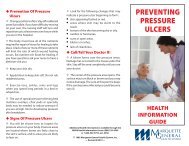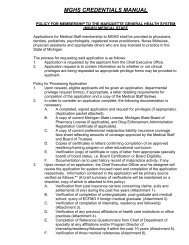Colonoscopy and Polypectomy.pdf - Marquette General Hospital
Colonoscopy and Polypectomy.pdf - Marquette General Hospital
Colonoscopy and Polypectomy.pdf - Marquette General Hospital
You also want an ePaper? Increase the reach of your titles
YUMPU automatically turns print PDFs into web optimized ePapers that Google loves.
COLONOSCOPY AND POLYPECTOMY<br />
♦ This pamphlet has been designed by the health care<br />
professionals of <strong>Marquette</strong> <strong>General</strong> <strong>Hospital</strong> to provide you with<br />
information about having a colonoscopy <strong>and</strong> polypectomy. When<br />
you have finished reading this pamphlet you should be able to:<br />
• define colonoscopy <strong>and</strong> polypectomy.<br />
• state the instructions given to patients before <strong>and</strong> after<br />
procedure.<br />
• state the possible complications following the procedure.<br />
♦ If you any questions at all about the procedure, please feel free<br />
to ask your health care provider.<br />
♦ Your doctor has decided, after careful medical assessment, that<br />
a colonoscopy is necessary for further evaluation <strong>and</strong> treatment of<br />
your condition. It is a valuable tool for the diagnosis, treatment,<br />
<strong>and</strong> follow-up of many diseases of the large intestine.<br />
Abnormalities suspected by x-ray can be confirmed <strong>and</strong> studied in<br />
detail. Even when x-rays are negative, the cause of symptoms<br />
such as rectal bleeding or change in bowel habits may be found.<br />
♦ <strong>Colonoscopy</strong>’s greatest impact is probably in its contribution to<br />
the control of colon cancer in by polyp removal. Before<br />
colonoscopy became available, major abdominal surgery was<br />
often necessary to remove colon polyps to determine if they were<br />
benign (noncancerous) or malignant (cancerous). Now, most<br />
polyps can be removed easily <strong>and</strong> safely without surgery.<br />
WHAT IS A COLONOSCOPY?
♦ A colonoscopy is an examination of the colon using a<br />
colonoscope.<br />
♦ A colonoscope is a long flexible tube that is about the thickness<br />
of a finger. It is inserted through the rectum into the large intestine<br />
(colon) <strong>and</strong> allows your doctor to carefully examine the lining of the<br />
colon.<br />
♦ If your doctor sees a suspicious area or needs to evaluate an<br />
area of inflammation in greater detail, he can pass an instrument<br />
through the colonoscope <strong>and</strong> take a small piece of tissue (biopsy)<br />
for examination in the laboratory. Biopsies are taken for many<br />
reasons <strong>and</strong> do not necessarily mean that cancer is suspected.<br />
WHAT IS A POLYPECTOMY?<br />
♦ A polypectomy is a procedure used to remove a polyp(s).<br />
♦ During the course of the procedure, a polyp may be found.<br />
Polyps are abnormal growths of tissue which vary in size from a<br />
tiny dot to several inches. If polyps are detected, these will be<br />
removed by passing a wire loop (snare) through the colonoscope<br />
<strong>and</strong> severing the attachment of the polyp from the intestinal wall<br />
by means of an electric current (cautery). You will not feel any<br />
pain during removal of the polyp.<br />
♦ Polyps should always be removed because they could cause<br />
rectal bleeding or contain cancer.<br />
♦ Although the majority of polyps are benign a small percentage<br />
may contain an area of cancer. Colon cancer is a leading form of<br />
cancer in the United States.
WHAT PREPARATION IS REQUIRED?<br />
♦ For the best possible examination, the colon must be clean <strong>and</strong><br />
completely empty. The usual preparation includes:<br />
• clear liquids after lunch the day prior to the exam.<br />
• start Colyte (or Golytely) prep (one gallon) at 4:30 p.m. the day<br />
prior to the exam.<br />
♦ A preparation kit or a prescription for the kit will be provided by<br />
your doctor.<br />
♦ Discontinue the use of aspirin products <strong>and</strong> iron tablets for one<br />
week before the procedure.<br />
♦ If you are having the colonoscopy as an outpatient, someone<br />
must accompany you to the Endoscopy Unit for the procedure<br />
since you will be given medication to help you relax. After the<br />
procedure you will be drowsy, so you will need someone to take<br />
you home. You will not be allowed to drive for 24 hours after the<br />
procedure. Even though you may not feel tired, your judgment<br />
<strong>and</strong> reflexes may not be normal.<br />
♦ It is important for your doctor to know if you have had any<br />
barium x-rays in the past week, as Barium may interfere with this<br />
procedure. Please bring your x-rays with you.<br />
BEFORE THE PROCEDURE?<br />
♦ A registered nurse (RN) will be with you during the entire<br />
procedure. She will explain the procedure to you <strong>and</strong> ask for a<br />
brief medical history. Be sure to let your nurse know if you are
allergic to any medications, or are pregnant. You will be asked to<br />
sign a written consent form. This is the time for you to express<br />
your concerns or ask any questions. You can expect to spend<br />
approximately 2-4 hours in the Endoscopy Unit on the day of your<br />
exam.<br />
♦ In the procedure room you will be lying down on an examination<br />
table, in a private room. The nurse will check your blood pressure,<br />
a cardiac monitor will be applied to watch your heart beat, <strong>and</strong> a<br />
finger clip will be placed on your finger to monitor your oxygen<br />
level. An intravenous solution (IV) will be started into your vein.<br />
♦ Most patients are nervous <strong>and</strong> apprehensive about a<br />
colonoscopy, sedative medications (such as Demerol <strong>and</strong> Versed)<br />
are given through your IV to help you relax. These also may make<br />
you feel a little lightheaded <strong>and</strong> sleepy.<br />
DURING THE PROCEDURE<br />
♦ The procedure is conducted with you lying on your left side in a<br />
partially darkened room. Your doctor will apply lubricant around<br />
the anus <strong>and</strong> pass the colonoscope into your rectum <strong>and</strong> gradually<br />
advance the scope through the entire colon while examining the<br />
lining thoroughly. It is necessary for your doctor to use some air to<br />
aid him in the exam. This may cause you to feel distended <strong>and</strong><br />
full. If you have the urge to pass this air by rectum, you may do<br />
so, unless the doctor requests otherwise. The colon is quite<br />
twisted <strong>and</strong> tortuous. As the scope passes around some of the<br />
turns, it may cause a cramping or tugging sensation. This usually<br />
is relieved as the scope is straightened. The procedure may take<br />
anywhere from 10-30 minutes; if polyps are removed it may take<br />
longer.<br />
♦ In rare cases, passage of the colonoscope through the entire<br />
colon cannot be achieved. A limited examination may be sufficient<br />
if the area of suspected abnormalities was well visualized.
AFTER THE PROCEDURE<br />
♦ After the procedure is completed, the scope is removed <strong>and</strong><br />
you will be carefully observed for an hour or so, until the effects of<br />
the sedative medications have subsided. You may feel bloated<br />
<strong>and</strong> pass some gas after the procedure.<br />
♦ After this recovery period, if you are an outpatient, you will be<br />
allowed to return home with your escort. Your doctor will explain<br />
the results of your exam prior to your discharge.<br />
ARE THERE ANY COMPLICATIONS?<br />
♦ <strong>Colonoscopy</strong> <strong>and</strong> polypectomy procedures are safe <strong>and</strong><br />
associated with very low risk. They are performed by doctors who<br />
have been specially trained. Complications can occur but are<br />
uncommon.<br />
♦ One possible complication is a tear through the wall of the<br />
bowel (perforation) which may allow leakage of intestinal fluids.<br />
This may require hospitalization for observation <strong>and</strong> rarely surgery<br />
may be needed.<br />
♦ Bleeding may occur from the site of biopsy or polyp removal. It<br />
is unusually minor <strong>and</strong> stops on its own or can be controlled by<br />
cauterization (application of electrical current) through the<br />
colonoscope. Very rarely, transfusions or surgery may be required.<br />
♦ You may have localized irritation of the vein at the IV site where<br />
medication was injected. Other very rare risks include medication<br />
reactions <strong>and</strong> complications from unrelated diseases such as heart<br />
attack or stroke.
DISCHARGE INSTRUCTIONS<br />
♦ Do not drive or operate any motorized equipment for 24 hours.<br />
♦ No alcoholic beverages for 24 hours.<br />
♦ Medication side effects may include the following: blurred<br />
vision, difficulty with urination, dizziness <strong>and</strong> slower reaction time.<br />
♦ If you have severe symptoms of the above or develop a cough,<br />
pain, fever, or rectal bleeding, you should immediately contact the<br />
doctor who did the procedure.<br />
♦ Resume your normal diet <strong>and</strong> normal activity.


